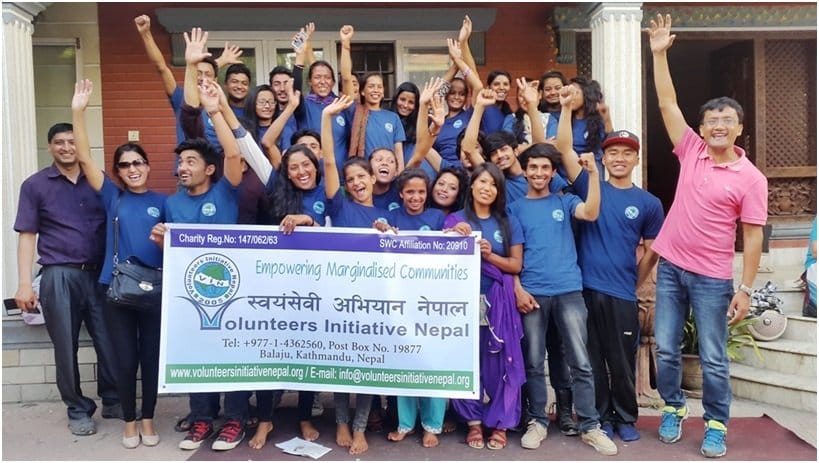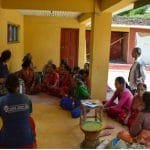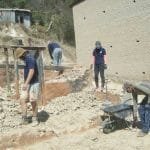
Disaster Risk Reduction research plays a significant role in reporting the cause and effects of a disaster and providing a fertile ground for further intervention. Multi-dimensional liability plays a substantial role in the development of disaster risk in Nepal. These periodic, large-scale catastrophes have amplified the country’s dependence on agriculture by hindering critical infrastructure and delaying the growth of other industries. High-risk atmosphere also discourages foreign investment contributing to the slow growth.
Many structures in Nepal are unsafe due to the lack of seismic technologies, trained masons/engineers and the high cost of seismic-resilient construction. Several buildings that were damaged by the earthquake are still being held together by bamboo, wooden or iron supporters to avoid further disintegration. Various schools and hospitals are in an unpredictably poor shape and their operations are still running with the utmost risk. Effective risk management is vital to develop seismic resilience – comprising risk assessments, construction regulations, zoning rules, resilient building techniques such as Building Back Better. The Government of Nepal still has not been able to fully identify the needs of these affected communities and address them properly.
The major goal of DRR Research project is in analysis and identifying the socio-economic vulnerabilities caused by a disaster among particular groups of people. The projects attempt to establish a baseline study in helping reduce such liabilities to the victims and the environment. Disaster is not people-neutral, it affects everybody differently on the basis of their gender, economic status, educational background, awareness and access to resources. Henceforth, a detailed study on these relative factors will assist the process of disaster risk-reduction and disaster management by making the approach more specific and effective.
We inspire volunteers and interns to join VIN to conduct research in the arena of Disaster Risk Reduction and contribute solutions to Nepal’s development. During your involvement in the volunteering project, you will live with a local Nepali host and be fully involved in Nepali language and culture. On the basis of your expertise and interest, the DRR Research volunteer/intern will perform one or more of the following tasks:
- Conduct a wide-ranging study in the sector of Disaster Management and ways to tackle the after-effects of a tragedy
- Use participatory rural appraisal methods to analyse the post-disaster effects on various households
- Organise field survey: Gather and evaluate testimony, record data and consolidate activity reports
- Implementing a needs assessment in the affected areas and prepare a detailed report
- Assist the coordinator in checking recorded data and providing data analysis
- Conduct risk and vulnerability mapping
- Establish and sustain a communication network with local government and the targeted populations suffering the after-effects of calamity
- Conduct frequent interviews
- Develop plans and approaches to mitigate the long-lasting effects of natural hazards
- Analyse the different effects of a disaster on different sub-sections of a population: How does it disturb children? How does it affect women? How does it distress the older population? How does it demotivate the youth?
Project Specific Skills
- Background or experience in Disaster Risk Reduction
- Proficiency in conducting workshops and training sessions
- Survey and Interview skills
- Knowledge on Research methodologies
- Ability to work with data and records
- Experience in statistical analysis will be an added asset
Desirable/ Common Skills
- Excellent communicator with good interpersonal skills
- A team player with good workethics
- Time management and leadership qualities
- Adaptable, flexible and able to work under pressure
- Accepting of different ideas and culture
- Problem solving: always be part of solutions than part of a problem
- Creative
- Positive attitude
Requirements
- Gender: Female / Male
- Minimum Age: 18+ years (16-17 years old person can volunteer but need to present parents’/ guardian’s consent letter)
- Language:English (Intermediate)
- Educational:High School Graduate
Your Experience/ Setting
Upon your arrival at Kathmandu Tribhuvan International Airport (TIA), you will receive a warm welcome and be transported to your hotel or hostel. If you are already in Nepal before the start of your placement, we can make alternative arrangements for you. You will undergo a comprehensive two- to three-day induction program after arrival. This induction will provide valuable information about your project and general information about the Nepalese language, culture, health, safety, and security. It is also an excellent opportunity to connect with fellow volunteers and interns who can become your companions for sightseeing and a source of support throughout your volunteer placement.
During the induction period, you will be accommodated in a budget hotel or hostel arranged by VIN. However, most of the VIN experience involves living with a Nepalese host family. While this immersion is essential for a complete experience, we understand that it can be challenging as you adapt to a new culture and adjust to facilities that may be more basic than you are accustomed to. Don’t worry; all our host families have experience accommodating volunteers, although their English-speaking abilities may vary. Also, you will have 24-hour access to our staff members for support and assistance throughout your placement.
Volunteers will be assigned to one of VIN’s working areas, which include Tarakeshor Municipality in Kathmandu, Taluwa, Thulachhap, and Bhadaure in Okhaldhunga, and Okharpouwa and Kaule in the Nuwakot district. While at the working site, volunteers are requested to bring their lunch box, water bottle, safety gear, face mask, and any other essential belongings. We advise volunteers to dress comfortably and modestly, preferably with long sleeves. Please get in touch with us for guidance and support if you want to raise project funds or collect project-specific resources. This will help the community a lot.
Schedule and Commitment
You will work five to six days a week, up to six hours per day. You may propose your preferred time and hours; however, the working time period will be dependent on the institution you have been placed. A minimum of 2 weeks’ time commitment is expected of a volunteer. The longer you commit; the better impact you can make. You should be willing to commit a certain amount of your free time and energy, show a lot of commitment and be a good listener. You are expected to work constructively and co-operatively maintaining good reputation and standards at all times. Volunteer should abide by relevant security concerns and access procedures. Moreover, you should be receptive and positive to performance appraisal, advice and feedback. Throughout your placement, you will have the full support of VIN. Your safety is our highest priority.
Your typical day might look like this:
| 07:00-08:00 | Tea/Leisure Time |
| 08:00-09:00 | Breakfast/Brunch (Nepali meal – Daal-Bhaat) |
| 09:00-10:00 | Preparation for sessions |
| 10:00-13:00 | Conduct Research |
| 13:00-14:00 | Lunch (Packed lunch) |
| 15:00-17:00 | Deliver sessions to people on cluster basis |
| 17:00-20:00 | Preparation for next day/Leisure time |
| 20:00-21:00 | Dinner (Nepali meal – Daal-Bhaat |
You will receive a clear and concise on-the-job instructions, course of action, context of work and policies/strategies before your placement begins. You will be provided with ample of guidance and support throughout the placement with trainings / onboarding sessions incase necessary. You will be in a constant communication and regular check-in with the VIN volunteer coordinator. VIN aims to maintain a culture of continuous feedback between the volunteer supervisor at the placement to monitor the performance of the volunteer and ensure the project delivers desired outcomes.
In case of an emergency, you may contact one of our Volunteer Coordinators who will be available anytime for your assistance and support.
Click here to Learn more on how volunteering works
Mid and Long Term Volunteers:
2 weeks minimum stay- € 380
3 weeks – 480€
4 weeks – 580€ (after 4th week, for each additional week €95)
University Internships:
4 weeks minimum stay- € 680 (for each additional week – €105
Click here to Learn what’s included and excluded in our Fees Section
Click here to Learn recruitment process on how volunteering works
Our projects are open year-round, and our inductions begin on the first and third Mondays of each month. We would like to ask that volunteers arrive one day before the start of the induction. You can choose the duration of your participation based on your available time. However, so that you know, our volunteering placements are limited. We highly recommend booking your placement in advance to secure your placement. Click here to apply.



 Member of
Member of